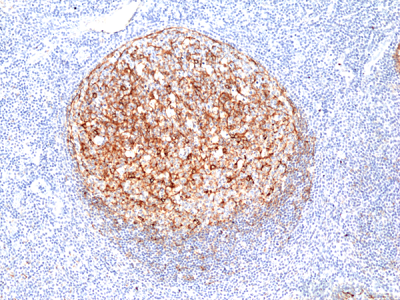
anti-Clusterin (human), Rabbit Monoclonal (RM437)
REV-31-1328-00
ApplicationsWestern Blot, ImmunoHistoChemistry
Product group Antibodies
ReactivityHuman
TargetCLU
Overview
- SupplierRevMAb Biosciences
- Product Nameanti-Clusterin (human), Rabbit Monoclonal (RM437)
- Delivery Days Customer2
- ApplicationsWestern Blot, ImmunoHistoChemistry
- CertificationResearch Use Only
- ClonalityMonoclonal
- Clone IDRM437
- Gene ID1191
- Target nameCLU
- Target descriptionclusterin
- Target synonymsAAG4, APO-J, APOJ, CLI, CLU1, CLU2, KUB1, NA1/NA2, SGP-2, SGP2, SP-40, TRPM-2, TRPM2, clusterin, aging-associated protein 4, apolipoprotein J, complement cytolysis inhibitor, complement lysis inhibitor, complement-associated protein SP-40,40, epididymis secretory sperm binding protein, ku70-binding protein 1, sulfated glycoprotein 2, testosterone-repressed prostate message 2
- HostRabbit
- IsotypeIgG
- Protein IDP10909
- Protein NameClusterin
- Scientific DescriptionClusterin shares homology with the small heat shock protein family of molecular chaperones. The mature secreted form of the protein is a glycosylated, 80-kDa disulfide-linked heterodimer of alpha and beta subunits (produced by internal cleavage). Clusterin is expressed in virtually all tissues and found in all human fluids. It is involved in numerous physiological processes important for carcinogenesis and tumor growth, including apoptotic cell death, cell cycle regulation, DNA repair, cell adhesion, tissue remodeling, lipid transportation, membrane recycling, and immune system regulation. Clusterin also exists as a nuclear protein. The secreted form of Clusterin has extracellular chaperone and anti-apoptotic activities while the nuclear form acts as a proapoptotic factor. - Recombinant Antibody. This antibody reacts to human Clusterin. Apllication: IHC, WB. Liquid. 50% Glycerol/PBS with 1% BSA and 0.09% sodium azide. Clusterin shares homology with the small heat shock protein family of molecular chaperones. The mature secreted form of the protein is a glycosylated, 80-kDa disulfide-linked heterodimer of alpha and beta subunits (produced by internal cleavage). Clusterin is expressed in virtually all tissues and found in all human fluids. It is involved in numerous physiological processes important for carcinogenesis and tumor growth, including apoptotic cell death, cell cycle regulation, DNA repair, cell adhesion, tissue remodeling, lipid transportation, membrane recycling, and immune system regulation. Clusterin also exists as a nuclear protein. The secreted form of Clusterin has extracellular chaperone and anti-apoptotic activities while the nuclear form acts as a proapoptotic factor.
- ReactivityHuman
- Storage Instruction-20°C,2°C to 8°C
- UNSPSC41116161







